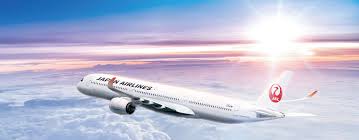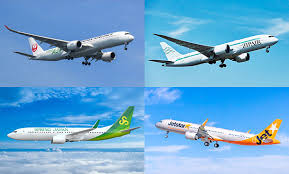Japanese shipowners have resumed investing in aircraft. The reason for this move is to secure depreciation financial resources. Investment in their core business, new shipbuilding, has become challenging due to soaring prices.
Japanese shipowners are returning to aviation investments. The bulk carrier market, in which Japanese shipowners excel, remains steady. However, the number of ships owned by Japanese shipowners is declining due to charterers (operators) exercising their purchase options (PO). Despite increased profits from the sale of owned vessels and a weaker yen, the sharp rise in new shipbuilding prices has made it difficult to invest in their core business.
(Text by Hiro Yamamoto)
Photo courtesy of JAL

■ Japan’s high effective tax rate
“Investing in ships compatible with new fuels is also challenging due to high prices. For the time being, we will secure depreciation financial resources through investments in aircraft, a Japanese shipowner based in the Chugoku region explained the current investment environment for shipowners.
Traditionally, few Japanese shipowners sought depreciation financial resources through aircraft investments. However, since the shipping downturn became apparent in 2016, their numbers have gradually increased.
Japan’s effective corporate tax rate of 33%-34% is considerably higher compared to the favorable tax regimes for shipping in tax-free countries like Greece and Singapore.
The aim of securing depreciation financial resources is for businesses to offset depreciation expenses against their profits by investing in specific movable or immovable properties. As depreciation expenses do not involve actual cash outflow, they do not reduce cash balances, but they allow for a reduction in taxable profits.
Currently, Japanese shipowners are seeing increased revenue from ships leased to operators (shipping companies) in U.S. dollar-denominated charter fees. Moreover, in the first half of this year, the yen’s exchange rate remained around 150 yen to the dollar, significantly boosting yen-denominated revenues.
In recent years, Japanese shipowners have increased “bareboat charters” (BBC), where only the vessel itself is leased out, alongside “time charters,” where they manage their own ships and enter into charter agreements with operators.
■ Exercise of Purchase Option
In the case of a bareboat charter (BBC), the Japanese shipowner takes out a low-interest loan from a regional bank to purchase a ship owned by the operator. The shipowner then signs a BBC contract with an overseas operator and leases the BBC ship back to the same operator.
In some cases, a purchase option (PO) is included in the BBC contract, allowing the operator to buy the vessel after a certain period.
Since last year, factors such as drought in the Panama Canal and blockages in the Red Sea have increased demand for shipping capacity in global trade routes, leading to a steady market for dry bulk shipping. Consequently, operators have exercised their purchase options by paying a set amount to Japanese shipowners. Afterward, operators can lease the purchased ships to third parties or sell them, earning capital gains.
The business environment for Japanese shipowners is complex. Currently, their revenue outlook seems favorable due to a steady market, a weaker yen, and profits from selling vessels through POs. However, when looking to the future and focusing on their core business of investing in newbuilds, investment in ships has stagnated.
■ Investment in vessels is difficult
New ship prices are being driven to “historically high levels,” according to a shipping broker, due to soaring steel prices, raw materials, and labor costs. Traditionally, Japanese shipowners have used profits from ship sales and charter revenues to invest in newbuilds, but now “there are few operators with strong creditworthiness who can offer charter rates that match the current newbuilding prices,” notes one Japanese shipowner.
Even the prices of second-hand ships remain high, linked to the prevailing market conditions.
While Japanese shipowners are currently enjoying a favorable revenue environment, they have not advanced their investments in newbuilds that would pave the way for the next generation. Although they have secured depreciable assets through aircraft investments, the question of how to proceed with investments in ships, their core business, remains. From the perspective of maintaining their fleet size, Japanese shipowners still face challenges.
〆日本船主は航空機への投資を再開した。その理由は償却財源を確保(Securing depreciation financial resources)するためである。日本船主は本業の新造船への投資が価格高騰で難航している。
日本船主がアビエーション(航空機)への投資を再開している。日本船主が得意とするバルカー市況は堅調に推移。一方、用船者(オペレーター)がパーチェス・オプション(Purchase Option,PO)を行使することで日本船主の保有船は減少している。日本船主の業績は、保有船の売却益や円安で収益はましているが、新造船価格の高騰で「本業」への投資が難しい状況にある。
(Text by Hiro Yamamoto)
Photo courtesy=JAL
■日本の高い実行税率
「新燃料に対応している船舶への投資も船価が高くできない。我々は当面、航空機への投資で償却財源を確保する」
中国地方に拠点を置く日本船主は現在の船主の投資環境についてこう説明した。
もともと、航空機に償却財源を求める日本船主は少ないとされていた。しかし、海運不況が顕在化した2016年以降は、その数も徐々に増えてきた。
日本の法人税の実効税率は33%―34%と海運無税のギリシャ、シンガポールの海運への優遇税制に比べ負担が重い。
償却財源の確保の目的とは、事業者が特定の動産や不動産に新たに投資することで利益から減価償却費の額をマイナスすることにある。減価償却費は実際の現金支出を伴わないため現金がマイナスになるわけではなく、財務上の利益を圧縮することが可能になる。
現在の日本船主はオペレーター(運航船社)にドル建て用船料で貸し出している船舶の収益が増加している。
さらに今年前半は為替が1ドル=150円台で推移したことで、円換算での収益を大きく押し上げた。
ここ数年、日本船主は自身が船舶管理を行い、オペレーターと用船契約を結ぶ「定期用船」と並行して船舶そのものだけを貸し出す「裸用船」(Bare boat charter, BBC)を増やした。
※続きは来週以降の日本海事新聞で記事になる予定です。
